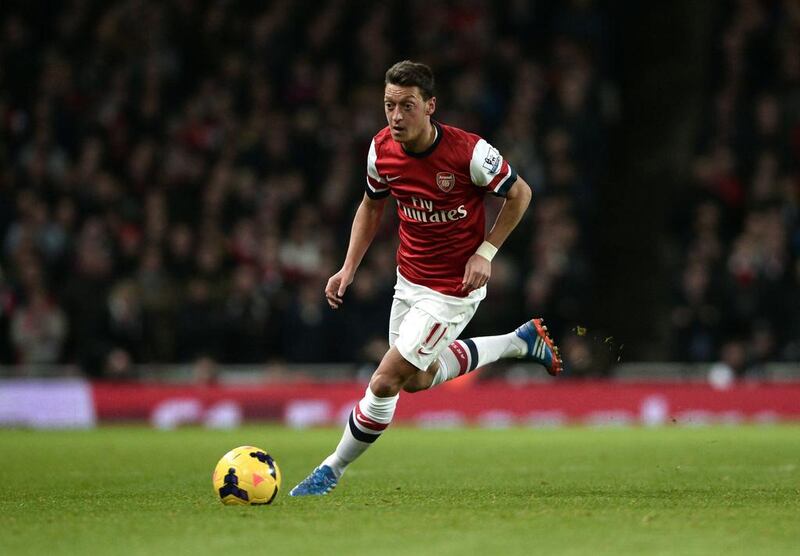When Mesut Ozil arrived, amid a blaze of relief, on the final day of the transfer window, he was hailed as the saviour of Arsenal’s season.
The impression even then was that Arsenal, so starved for transfer activity, could have signed almost anybody for £42 million (Dh258m) and it would have lifted spirits, but Ozil was genuinely revelatory on the pitch as well.
He found space, he threaded passes through opposing defences, he gave a jolt of imagination to a side that had looked flat in the opening weeks of the season.
During the past month or so, though, the sense that he was not quite hitting the heights of September has magnified into occasionally audible grumbling from fans at the Emirates Stadium.
It is not a foolproof measure of form, but in his first 20 games for the club, Ozil was man of the match four times, scored five goals and registered nine assists. In his last 10 games, beginning with the 0-0 draw against Chelsea just before Christmas, he has not been man of the match at all, has not scored and has just one assist.
To an extent, that relates directly to other personnel. Players who operate as effectively an old-fashioned number 10 need passing options; they need players making runs beyond them that they can then pick out.
With Aaron Ramsey and Theo Walcott both injured, Arsenal have lost two of their principle assets in that regard, and with a more static attack, so Ozil’s effectiveness has lessened. But he has also looked weary, perhaps tired by the intensity of the English game, the lack of a winter break and the fact that he has been rotated far less than he was at Real Madrid, playing an average of 86 minutes per game as opposed to 63 last year.
“He needs understanding,” the manager, Arsene Wenger, said last week, responding to suggestions that Ozil’s languid style reflected a player who lacked intensity.
“Because he always wants to do well. He cares. He cares about the game, he needs more support. He feels the pressure, of course. Because he knows a lot is expected when you are a big transfer like that.
“There is a big expectation level but he should not worry about that, just play in the team and enjoy it, give his best. That’s the best way to deal with it.”
Against Bayern Munich on Wednesday, there is another point of concern, which is that Ozil is not the most diligent player defensively. According to whoscored.com, for instance, he makes only 0.9 tackles and 0.2 interceptions per game. By way of comparison, Santi Cazorla, not the most forceful player, has made 1.5 tackles and 1.1 interceptions per game.
In the majority of Premier League games, in any match against lesser opposition, that is not a concern: Ozil’s main role is to create. But against the better sides, it is a major issue, particularly if opponents have a player who creates from deep.
Two weeks ago, Ozil’s inability to handle Steven Gerrard was one of the reasons Liverpool were so dominant and won 5-1. Assuming Phillip Lahm plays in a central midfield role for Bayern, Arsenal will need to shut him down, and it is far from clear if Ozil is the best player to do that. There may, in fact, be an argument for switching to a 4-3-3, leaving out Ozil and using Tomas Rosicky and Jack Wilshere to try to disrupt Bayern’s creative hub.
And that is the Ozil gamble: does what he offers from a creative point of view outweigh his defensive shortcomings? In most games the answer is obvious; against the very best, it is less clear-cut.
sports@thenational.ae





